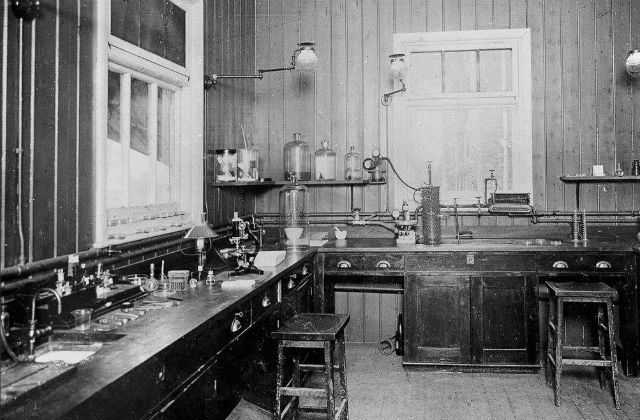Next year, we will celebrate the centenary of the opening of the Central Veterinary Laboratory in Weybridge. It's a great opportunity to reflect on our achievements and look ahead at our ever-changing and interesting roles. As UK Chief Veterinary Officer, I take great pride in heading a profession which has a rich and proud history since the reign of Queen Victoria.
A rich heritage
The Veterinary Department of the Privy Council was established to tackle a devastating epidemic of cattle plague (Rinderpest) in 1865.
The Veterinary Laboratory Service was established at the beginning of the last century in a basement at 4 Whitehall Place. Samples from diseased pigs were transported for examination here from around the country.

In 1917 research transferred to the newly opened Central Veterinary Laboratory at a site near Weybridge. It was one of the first purpose-built state veterinary laboratories in the world and is now an integral part of the Animal and Plant Health Agency (APHA).
Government vets advised on the introduction of the Tuberculosis Order 1925. For the first time this linked the spread of disease in humans with the consumption of untreated milk and led to bovine TB testing in cattle herds.
Our mission continues to be to ensure high animal welfare standards and protect the country from animal disease.
Our network of laboratories have since been behind many significant developments in disease surveillance.
We give research and specialist advice to government, industry and private vets. We also work closely with public health bodies to protect human health from diseases like salmonella.
A changing role
From boosting food production during World War 2 to tackling Foot and Mouth Disease, government vets have fulfilled a wide range of operational, research and policy roles.
Working in front line positions, we interact with animals and their keepers. We investigate diseases and monitor the quality of our food industries. We give advice that can influence policy in the UK and internationally and play a critical role in the detection, definition and management of animal-related risks.
Our workplace is Whitehall as well as the farm and the lab. It's not uncommon for the modern government vet to attend meetings with European colleagues in Brussels one day and to be on the site of an animal disease outbreak the next. In both cases having to make critical decisions to ensure the welfare of animals and the safety of our food.
An exciting and fulfilling career
The Service continues to protect the country from well-known and new threats. Avian flu for example.
Since November 2014 we have had 3 cases: A case of H5N8 avian flu in a duck breeding farm in Yorkshire. A low severity case of avian flu H7N7 in chickens at a farm in Hampshire another case of H7N7 in July 2015 in Lancashire. Thanks to the swift and robust action of our vets, all 3 cases were successfully contained and eradicated with minimal disruption to industry or risk to human health.
As government vets, the work we do is hugely fulfilling, and requires us to draw on a wide range of skills. Judgement and communication are particularly important, and complex problem-solving is often required.
Compared to work in a private practice, government vet work tends to be much wider in scope, impact and influence. It often involves veterinary medicine at both a national and international level.
Many of our vets work in multidisciplinary teams with a very broad range of people, from both within and outside the Civil Service, and often with our counterparts in other countries.
The applied-science nature of veterinary research jobs means what we do will often have a direct impact on the real world, resulting in improvements to disease control and surveillance activities. We also have the opportunity to give expert advice in outbreak situations and work alongside leading scientists.
Vets of the future
On our 150th anniversary we can look back proudly knowing we have promoted better animal welfare and the detection of threats to animal health for over a century and we will continue to do so.
We can look forward to meeting the new challenges head on, from raising animal welfare standards while supporting a competitive food industry to protecting human health in a globalised economy.
There has never been a more exciting time to join the service and we encourage students and vets to look at the Civil Service as a meaningful opportunity to make an impact and gain unparalleled professional experience.

1 comment
Comment by David Redwood posted on
Will there be anything resembling a centenary event this year?
If so will invitations be forthcoming for those ex-employees who worked their whole careers at CVL/VLA for 40 years?